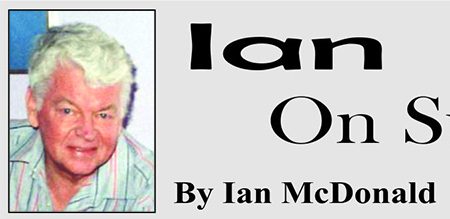
Adventures in reading
As I get older, the attractions of foreign travel and the lures of encountering new places and fresh faces are rapidly fading.

As I get older, the attractions of foreign travel and the lures of encountering new places and fresh faces are rapidly fading.

It is said that science and poetry do not mix. It is said that science is down to earth and poetry is up in the clouds.
It happens all the time in small, closely-knit groups – Cabinets, party executives, boards of directors, Church congregations or club committees.

In a vibrant democracy elections should be a cause for celebration, an ever welcome occasion regularly marking the successful outcome of what in any country’s history has always been a long struggle to overcome authoritarian, and often brutal, rule.

Samuel Johnson, the great 18th Century English man of letters, is the shrewdest teacher on the human condition I know.

Toronto is a calm, clean, well-ordered, cosmopolitan, peaceful city. If one long weekend in this city of two and a half million people there are a couple of murders it is an alarming law and order crisis.

I do not think the intelligent and opened-minded Minister of Education will mind me delivering little, well-meant lectures to her from time to time.

As golden afternoon transmutes into silver evening and then into velvet darkness fretted by stars I sit to read and think and dream.

One of the most serious aspects of life today is the widening gap between talk and action.

The world yearns for more and more speed – speed of exchanged communications, immediate access to information, concept instantly converted into conception – is destroying an important part of our lives.

As a companion volume to my planned book Portraits of Extraordinary people, I intend to add Portraits of Extraordinary Places.

In my column today I simply give two poems which I love and especially recall at a time when the world is awry – the pandemic unrelenting and tenacious and climate change unstoppably undermining all foundations – without those in authority seeming to know what to do or take decisive action as they interminably squabble.

I wrote this column long ago. I do not think I would want to change much, if any, of it now for it to be relevant – but I am anxious to learn if the Ministry of Education or educational experts can tell how things may have changed for the better.

It is necessary to repeat again and again that in the background of all our lives there exists a fundamental and dominating lie.

The title I gave to one of my collections of poems is Between Silence and Silence.

I do not get the impression that governance in the world is good or that it is getting better.

Intermittently, and especially during memorable times up the immense and soul-redeeming Essequibo, I like to read Shelley – as we all should do from time to time since he is pre-eminently the poet of hope.
Towards the end of life – and when you are eighty-eighty and counting you are not very distant from the end – you become more reflective.

Some years ago the London Times, on an exceptionally dull day for news, carried a story which it headlined “Small earthquake in Chile: no damage, no injuries.”

The world is endlessly fascinating, countlessly full of interesting people. Once at a party long ago I met a visitor to Guyana who turned out to be an expert on grass-hoppers.
The ePaper edition, on the Web & in stores for Android, iPhone & iPad.
Included free with your web subscription. Learn more.